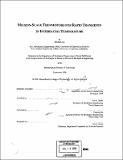Micron-scale thermistors for rapid transients in interfacial temperature
Author(s)
Liu, Michael (Michael Chr-Heng), 1975-
DownloadFull printable version (98.03Mb)
Advisor
Ain A. Sonin and Taiqing Qiu.
Terms of use
Metadata
Show full item recordAbstract
The shape of freezing droplets is controlled by the motion of the molten interface, or contact line, between the liquid droplet and the solid target. The solution for the heat transfer between the liquid and solid has an analytical singularity at the contact line. We therefore wish to closely examine the temperature history of the contact line as it spreads across a target. In order to achieve high spatial and temporal resolution in our temperature sensors, we use microsensors (specifically, thin-film thermistors), which are built using standard integrated-circuit techniques. A complete data acquisition system was built around the sensors, including various signal-conditioning hardware and software. The integrated-circuit processes to build our microsensors limit our choices of target materials. Previous analyses of droplet spreading in our group have focussed on the spreading of molten materials on targets of the same kind or of similar thermal characteristics. In contrast, the microsensor targets will have thermal conductivities and diffusivities at least an order of magnitude greater than that of the molten materials in use. Thus, we also characterized the spreading of a molten droplet on a substrate of a different type. Finally, we characterized the sensors' resistance response to temperature changes, during both spreading and calibration experiments.
Description
Thesis (S.M.)--Massachusetts Institute of Technology, Dept. of Mechanical Engineering, 1998. Includes bibliographical references (leaves 93-94).
Date issued
1998Department
Massachusetts Institute of Technology. Department of Mechanical EngineeringPublisher
Massachusetts Institute of Technology
Keywords
Mechanical Engineering